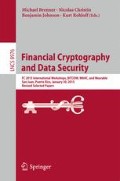Abstract
Two of the major branches in secure multi-party computation research are secret sharing and garbled circuits. This work succeeds in combining these to enable seamlessly switching to the technique more efficient for the required functionality. As an example, we add garbled circuits based IEEE 754 floating-point numbers to a secret sharing environment achieving very high efficiency and the first, to our knowledge, fully IEEE 754 compliant secure floating-point implementation.
This research was, in part, funded by the U.S. Government. The views and conclusions contained in this document are those of the authors and should not be interpreted as representing the official policies, either expressed or implied, of the U.S. Government. This work has also received funding from the Estonian Research Council through grant IUT27-1, and ERDF through EXCS.
Access this chapter
Tax calculation will be finalised at checkout
Purchases are for personal use only
References
Aliasgari, M., Blanton, M., Zhang, Y., Steele, A.: Secure computation on floating point numbers. In: Proceedings of NDSS 2013. The Internet Society (2013)
Bellare, M., Hoang, V.T., Keelveedhi, S., Rogaway, P.: Efficient garbling from a fixed-key blockcipher. In: Proceedings of SP 2013, pp. 478–492. IEEE Computer Society, Washington, DC (2013)
Bellare, M., Hoang, V.T., Rogaway, P.: Foundations of garbled circuits. In: Proceedings of CCS 2012, pp. 784–796. ACM, New York (2012)
Ben-David, A., Nisan, N., Pinkas, B.: FairplayMP: a system for secure multi-party computation. In: Proceedings of CCS 2008, pp. 257–266. ACM (2008)
Bogdanov, D.: Sharemind: programmable secure computations with practical applications. Ph.D. thesis. University of Tartu (2013)
Bogdanov, D., Laud, P., Laur, S., Pullonen, P.: From input private to universally composable secure multi-party computation. In: Proceedings of CSF 2014. IEEE Computer Society (2014)
Bogdanov, D., Laud, P., Randmets, J.: Domain-polymorphic programming of privacy-preserving applications. In: Proceedings of PETShop 2013, pp. 23–26. ACM (2013)
Bogdanov, D., Niitsoo, M., Toft, T., Willemson, J.: High-performance secure multi-party computation for data mining applications. IJIS 11(6), 403–418 (2012)
CBMC-GC. http://forsyte.at/software/cbmc-gc/
Damgård, I., Pastro, V., Smart, N., Zakarias, S.: Multiparty computation from somewhat homomorphic encryption. In: Safavi-Naini, R., Canetti, R. (eds.) CRYPTO 2012. LNCS, vol. 7417, pp. 643–662. Springer, Heidelberg (2012)
Franz, M., Katzenbeisser, S.: Processing encrypted floating point signals. In: Proceedings of MM&Sec 2011, pp. 103–108. ACM, New York (2011)
Goldberg, D.: What every computer scientist should know about floating-point arithmetic. ACM Comput. Surv. 23(1), 5–48 (1991)
Henecka, W., Kögl, S., Sadeghi, A.R., Schneider, T., Wehrenberg, I.: TASTY: tool for automating secure two-party computations. In: Proceedings of CCS 2010, pp. 451–462. ACM, New York (2010)
Holzer, A., Franz, M., Katzenbeisser, S., Veith, H.: Secure two-party computations in ANSI C. In: Proceedings of CCS 2012, pp. 772–783. ACM (2012)
Huang, Y., Evans, D., Katz, J., Malka, L.: Faster secure two-party computation using garbled circuits. In: Proceedings of SEC 2011. USENIX Association (2011)
754-2008 - IEEE standard for floating-point arithmetic (2008). http://ieeexplore.ieee.org/servlet/opac?punumber=4610933
Kamm, L., Willemson, J.: Secure floating-point arithmetic and private satellite collision analysis. IJIS (2014). http://link.springer.com/article/10.1007%2Fs10207-014-0271-8
Kolesnikov, V., Schneider, T.: Improved garbled circuit: free XOR gates and applications. In: Aceto, L., Damgård, I., Goldberg, L.A., Halldórsson, M.M., Ingólfsdóttir, A., Walukiewicz, I. (eds.) ICALP 2008, Part II. LNCS, vol. 5126, pp. 486–498. Springer, Heidelberg (2008)
Kreuter, B., Mood, B., Shelat, A., Butler, K.: PCF: a portable circuit format for scalable two-party secure computation. In: Proceedings of SEC 2013, pp. 321–336. USENIX Association, Berkeley (2013)
Kreuter, B., Shelat, A., Shen, C.: Billion-gate secure computation with malicious adversaries. In: Proceedings of Security 2012. USENIX Association (2012)
Lindell, Y., Pinkas, B.: A proof of security of Yao’s protocol for two-party computation. J. Cryptol. 22(2), 161–188 (2009)
Liu, Y.C., Chiang, Y.T., Hsu, T.S., Liau, C.J., Wang, D.W.: Floating point arithmetic protocols for constructing secure data analysis application. Procedia Comput. Sci. 22, 152–161 (2013)
musl libc. http://www.musl-libc.org/
Pinkas, B., Schneider, T., Smart, N.P., Williams, S.C.: Secure two-party computation is practical. In: Matsui, M. (ed.) ASIACRYPT 2009. LNCS, vol. 5912, pp. 250–267. Springer, Heidelberg (2009)
Pullonen, P., Siim, S.: Combining secret sharing and garbled circuits for efficient private IEEE 754 floating-point computations. Cryptology ePrint Archive, Report 2014/990 (2014)
Seroussi, G.: Table of low-weight binary irreducible polynomials (1998). http://www.hpl.hp.com/techreports/98/HPL-98-135.html
Shamir, A.: How to share a secret. Commun. ACM 22(11), 612–613 (1979)
Yao, A.C.: Protocols for secure computations. In: Proceedings of SFCS 1982, pp. 160–164. IEEE Computer Society, Washington, DC (1982)
Acknowledgments
We would like to thank the authors of the CBMC-GC circuit compiler for supporting us in our efforts to generate the described circuits.
Author information
Authors and Affiliations
Corresponding author
Editor information
Editors and Affiliations
Rights and permissions
Copyright information
© 2015 International Financial Cryptography Association
About this paper
Cite this paper
Pullonen, P., Siim, S. (2015). Combining Secret Sharing and Garbled Circuits for Efficient Private IEEE 754 Floating-Point Computations. In: Brenner, M., Christin, N., Johnson, B., Rohloff, K. (eds) Financial Cryptography and Data Security. FC 2015. Lecture Notes in Computer Science(), vol 8976. Springer, Berlin, Heidelberg. https://doi.org/10.1007/978-3-662-48051-9_13
Download citation
DOI: https://doi.org/10.1007/978-3-662-48051-9_13
Published:
Publisher Name: Springer, Berlin, Heidelberg
Print ISBN: 978-3-662-48050-2
Online ISBN: 978-3-662-48051-9
eBook Packages: Computer ScienceComputer Science (R0)

